OJ Simpson, American footballer whose trial for murder captivated global audiences – obituary
- Oops!Something went wrong.Please try again later.
- Oops!Something went wrong.Please try again later.
- Oops!Something went wrong.Please try again later.

OJ Simpson, the American athlete, film star and murder suspect, who has died aged 76, was a one-time paragon, celebrated national hero and revered role model; in the course of a few months, following the brutal killing of his second wife in the mid-1990s, he morphed into a monstrous hate-figure and in 2006 was ranked among the 50 Most Loathsome Americans of the Year.
If there was a Shakespearean quality about Simpson’s fall from grace, it was indissolubly linked to his almost God-like pre-eminence as a black American who, despite his humble origins, had made it to the top, lived the dream and claimed the glittering prizes.
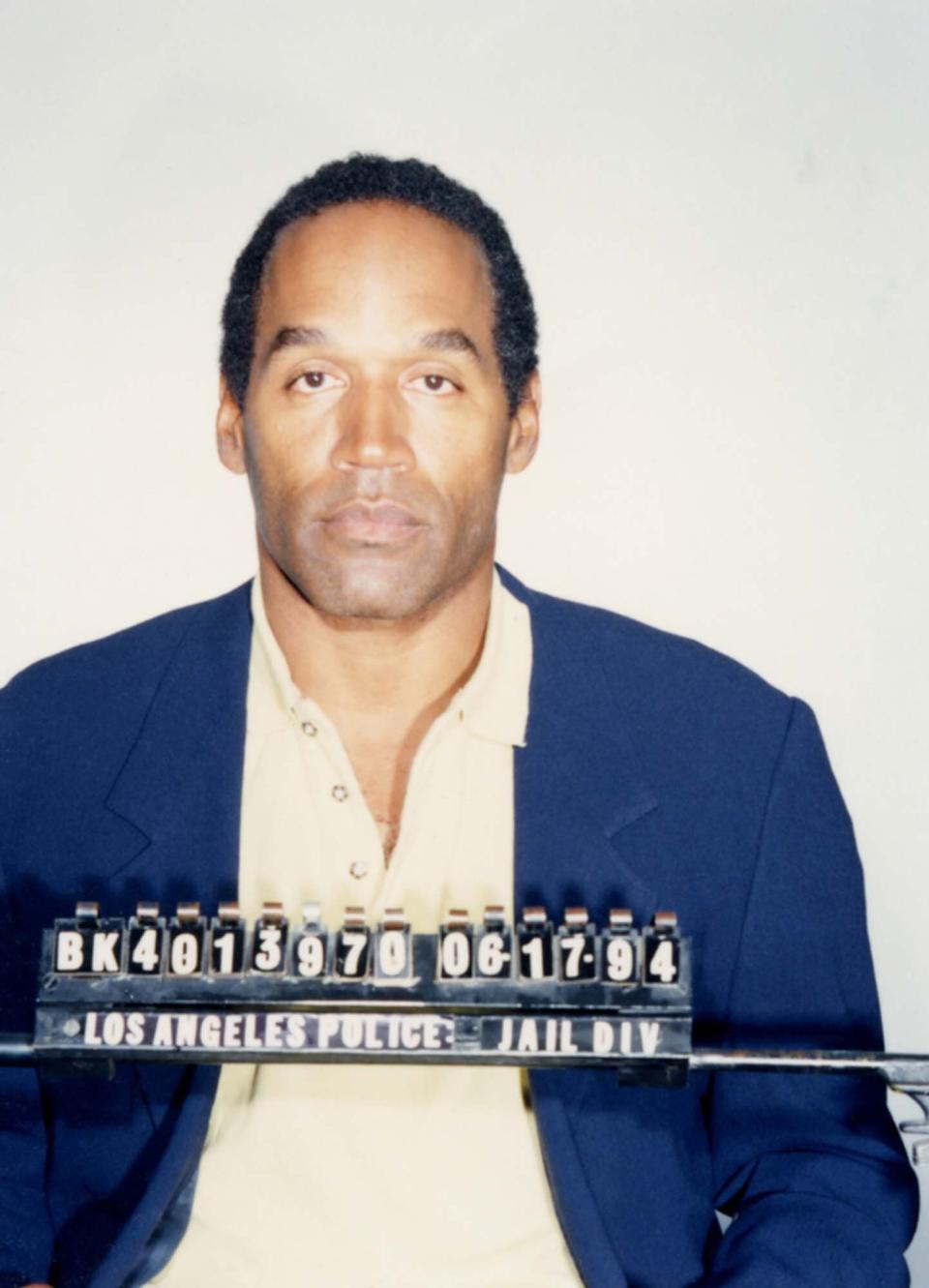
Simpson’s fate at the climax of his criminal trial in 1995 – one of the longest in American legal history – became essential viewing for the American public and drew one of the biggest audiences in the history of television. Polls suggested that most black Americans regarded Simpson as a victim of racism, while more than half of whites considered him guilty.
When the jury found Simpson not guilty of murder, the verdict was widely interpreted as America’s great black hope beating white man’s justice. Not satisfied with being cleared, Simpson also wanted his adulation back, but in the event he became a social and professional pariah.
The impotent rage felt by many white Americans at his baffling acquittal was compounded more than a decade later by what his critics saw as Simpson’s gruesomely detailed confession to double murder in a book to be coyly titled If I Did It but which, in the event, he never actually published.

Simpson also starred in a pay-per-view special called Juiced (2003), in which he was seen trying to sell people his infamous white Ford Bronco, saying: “It was good for me – it helped me get away.”
Certainly, from the moment America stopped and watched Simpson’s Bronco crawling down a California freeway, to the verdict and its far-reaching aftermath, the nation – and the world – was held captive by his story. Simpson’s trial for the murder of his ex-wife Nicole and her friend Ron Goldman both riveted and appalled global television viewers.
It prompted a debate about American justice and the media; many commentators accused broadcasters in particular of perverting priorities by turning Simpson’s trial into a festival of Hollywood hoop-la that, as one British editorial put it, “often bordered on the theatrical and the farcical”. Another condemned Simpson’s trial as “a sick, dire joke”.

In November 1995 he was acquitted in less than four hours on a unanimous jury decision at the end of an extraordinary trial that had gripped America for a whole year. Simpson celebrated his acquittal with a party at his mansion fuelled by 40 cases of champagne.
Nicole Brown Simpson and Ronald Goldman were stabbed to death outside her townhouse in the wealthy Brentwood district of Los Angeles in June 1994. Simpson was arrested soon after the killings, but insisted from the start that he was “absolutely, 100 per cent not guilty”.
Prosecuting lawyers produced evidence that included a pair of gloves – one found at the crime scene, the other at Simpson’s apartment. But after Simpson struggled to fit the gloves on, Johnnie Cochran, the most flamboyant of his all-star legal team, told jurors: “If it doesn’t fit, you must acquit.”
Prosecutors also emphasised his violent relationship with his ex-wife; she had often complained of being beaten by Simpson, who was jealous of her and other men.
Simpson described Nicole’s bruising injuries as merely the result of friendly “wrassling”, but after what was described as their “rocky marriage”, in 1992 she filed for divorce. After her murder, suspicion immediately fixed on Simpson who, instead of surrendering to police, fled in his Bronco, disguised and carrying his passport.
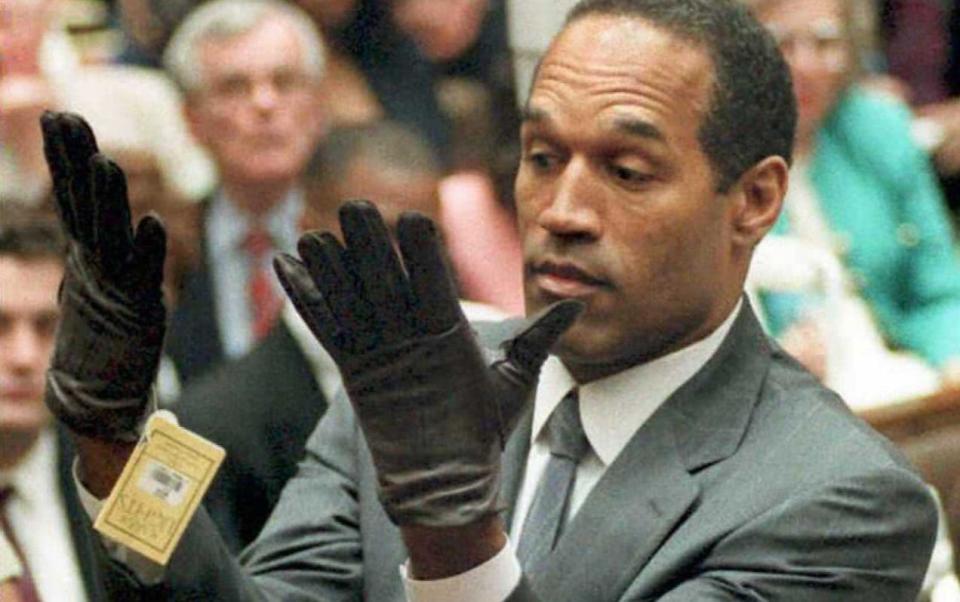
After the criminal trial the families of Ronald Goldman and Nicole Brown Simpson filed a civil court case against Simpson and in 1997 were awarded more than $30 million in compensatory damages. The civil jury took six days to reach a verdict and to declare Simpson responsible.
Simpson successfully challenged paying the award. He retained custody of his children and moved to Florida.
The talent agency that had represented Simpson for 20 years and his personal agent both dropped him as a client. Meanwhile, most of Simpson’s friends had melted away, especially in acutely class-conscious Los Angeles, where he was told that he was no longer welcome at his exclusive golf club.
Orenthal James Simpson was born on July 9 1947 in San Francisco. He had a difficult upbringing: his parents separated when he was five, by which time he had contracted rickets, requiring him to wear homemade braces.
At Galileo High School he played for the school American football team, but by 1960 he had joined a San Francisco street gang called the Persian Warriors, and in 1962 was incarcerated at a local youth guidance centre.
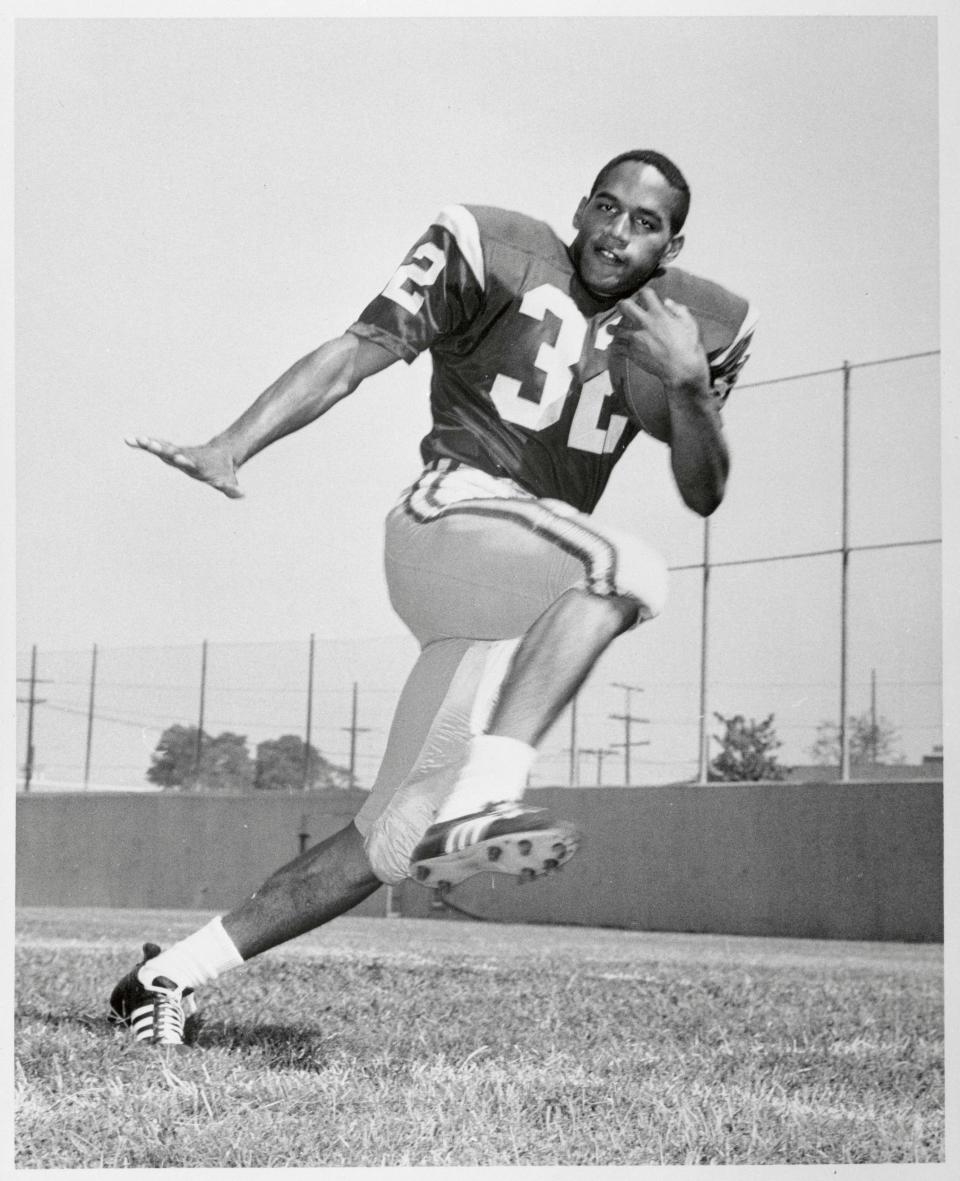
His high school grades being low, he enrolled at a junior college, but on the strength of his athletic prowess was admitted to the University of Southern California where, in the 1968 Rose Bowl, he was named the game’s most outstanding player.
Universally known by then as “OJ”, or “The Juice”, Simpson quickly rose to fame as one of the most celebrated running backs in the history of American football. He spent most of his career playing for the Buffalo Bills in New York, finishing his professional days with the San Francisco 49ers.
On his retirement from football, Simpson became a successful actor, appearing in the television mini-series Roots (1977) and several successful feature films; he played a dimwitted detective in the Naked Gun trilogy between 1988 and 1994 and, in The Klansman (1974), a man framed for murder by the police. In the same year, he also appeared in the highly popular disaster movie The Towering Inferno.
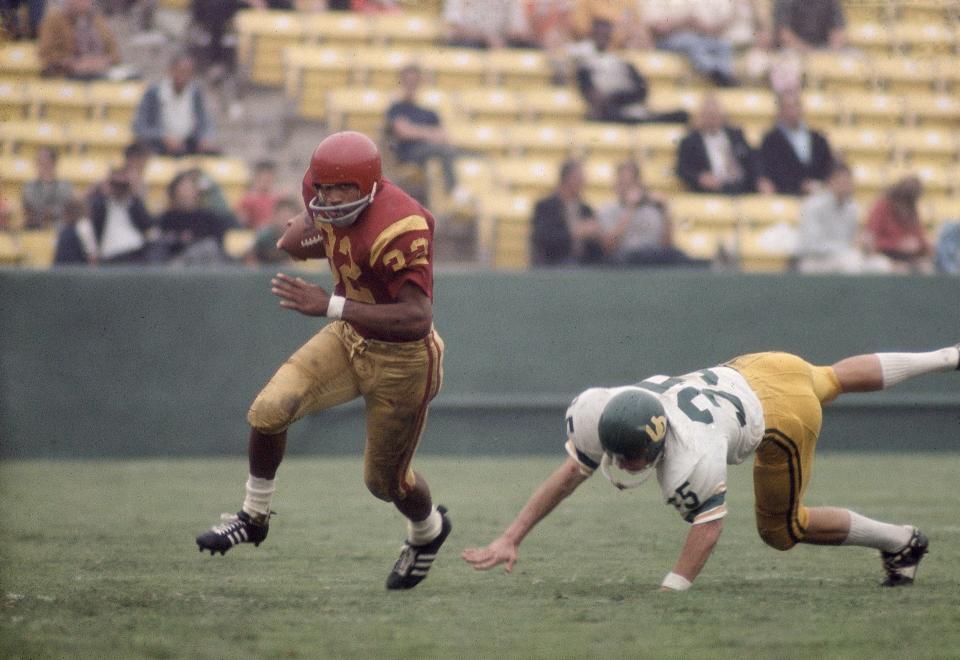
He was reportedly considered for the lead role in The Terminator before the producers decided he looked insufficiently villainous. However, Simpson’s undoubted charm and natural charisma landed him several endorsement deals, notably with the Hertz car hire firm. As well as his acting, he enjoyed stints as a television sports commentator.
The damage to his reputation caused by his criminal and civil trials ruined Simpson’s acting career, and while continuing to draw his football pension he was forced to scrabble for television work. He visited Britain in the late 1990s, and addressed the Oxford Union, where he was heckled by protesting campaigners for women’s rights.
At the end of an interview with Ruby Wax for BBC One, Simpson pretended to stab her with a banana while mimicking the music from Psycho.
Late in 2006, Simpson earned further opprobrium by planning to publish a book about the murders for which he had been acquitted, but which apparently outlined a scenario predicated on his guilt.
His account, provisionally entitled If I Did It, was withdrawn at the 11th hour by the book’s publisher, Rupert Murdoch. Then in 2007, a Florida bankruptcy court gave the rights to the Goldman family, who published it under the title I Did It: Confessions of the Killer.
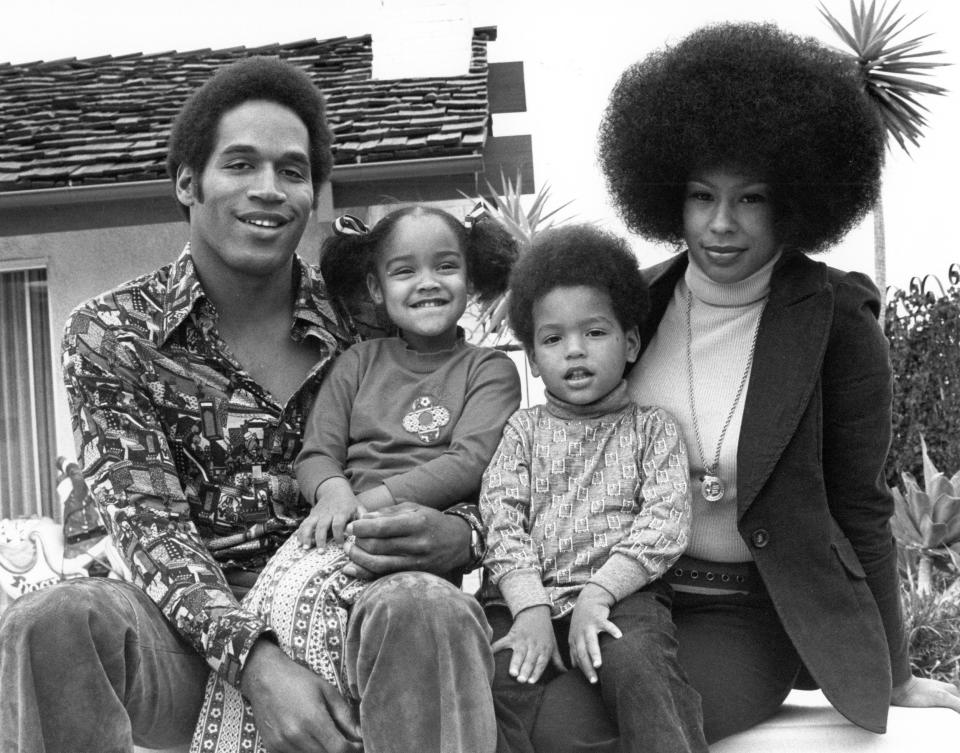
In 2008 he was sentenced to 33 years’ jail, with the possibility of parole after nine years, after holding up two sports memorabilia dealers in a room at the Palace Station hotel and casino in Las Vegas then stealing items from them that he had lost while trying to hide them from Ron Goldman’s family. He was released in 2017.
OJ Simpson’s first marriage, in 1967, to Marguerite L Whitley, ended in divorce after 12 years; in 1985 he married Nicole Brown, whom he had met while she was a 17-year-old waitress, and who divorced him in 1992.
Following his murder acquittal he had a 13-year relationship with Christie Prody, whom he had met when she was a 19-year-old cocktail waitress; when the relationship had ended she claimed that she had often feared for her life during it.
Simpson, who had been suffering from prostate cancer, is survived by two children from his first marriage – a third child drowned in a childhood accident – and by two children from his second.
OJ Simpson, born July 9 1947, died April 10 2024

